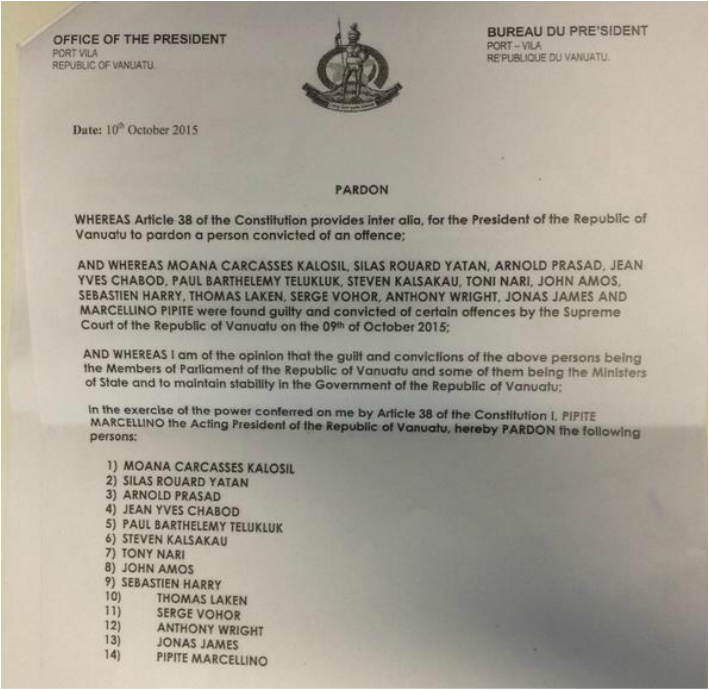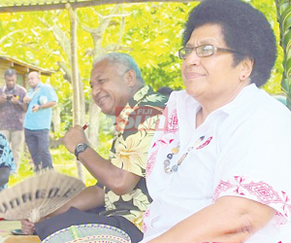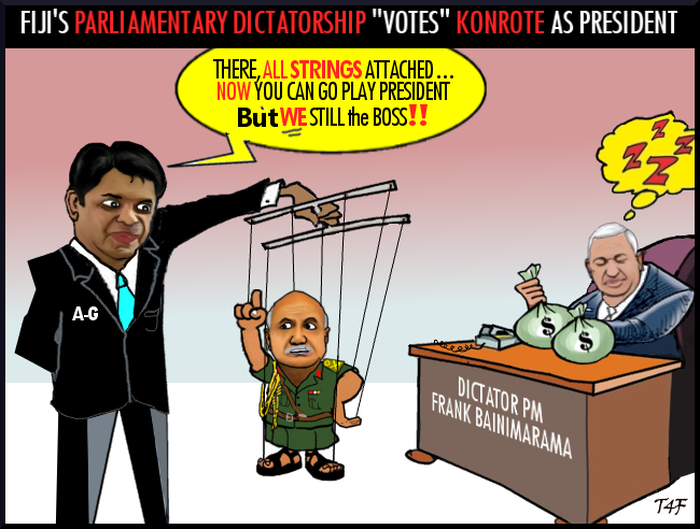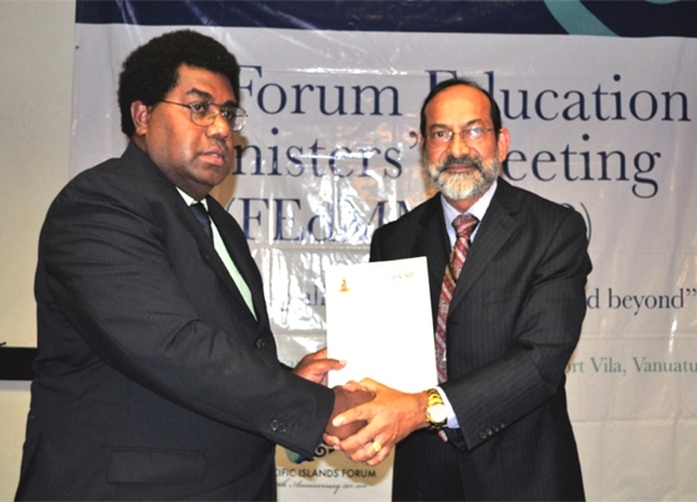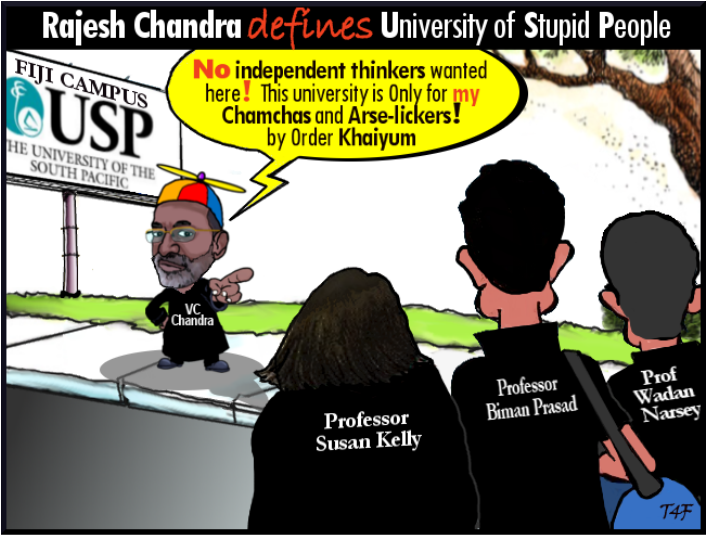When pressed on how the bribery convictions could spark instability, Pipite failed to answer. He was acting president, claiming he had received advice from five lawyers to enact the pardons, and gazetted the
decision on Sunday
"CONROTE" WHO: Fijians and even Rotumans take to social media asking who is Jioje Konrote - the new President; he is best known for taking part in all three Fijian coups, and finally gets top position in Fiji!
Pipite had signed a MOU with Speaker Luveni to foster close association with the parliaments of Fiji and Vanuatu
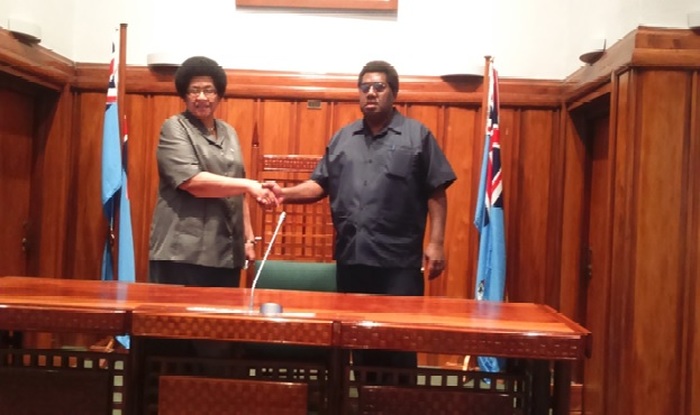
An anti-corruption group in Vanuatu has blasted a minister's decision to pardon himself and 13 other government MPs of bribery convictions as "a national disgrace".
Speaker Marcellino Pipite used his interim executive powers while the president was abroad to issue presidential pardons on Sunday, following last Friday's convictions by the Supreme Court.
Justice Mary Sey ruled that payments amounting to 35 million vat ($452,000) were corruptly made by the deputy prime minister, corruptly received, and designed to influence MPs in their capacity as public officials.
Mr Pipite said the unprecedented move was made in the best interests of the country and to avoid political instability seen elsewhere in the Pacific in recent decades.
But Jenny Ligo, the chair of Women Against Crime and Corruption, said it is "a national disgrace" and her group is planning a march to express their feelings.
"This is not on. They should wait patiently for the sentencing. But instead they have come to another level of doing (sic) a criminal act," she told Pacific Beat.
"They don't care about this country and its people, they only care about themselves.
"I'm calling on the citizens of Vanuatu, especially in Port Vila, if they can see the importance of upholding the law because this is all corruption.
"The opposition having not come out yet. Even the prime minister of this country is not doing anything. He also allows part of his government to mess up his administration."
Mr Pipite and the 13 other MPs, including deputy prime minister Moana Carcasses, were due to be sentenced on October 22.
They were facing a maximum of 10 years in jail along with the loss of their seats in parliament.
Ombudsman also 'suspended'
It emerged late this afternoon that Mr Pepite also issued an order suspending the nation's ombudsman, Kalkot Mataskelekele, while in his acting capacity as president.
Mr Mataskelekele, a former president himself, is refusing to accept its legality and insists he is still the ombudsman.
He said the letter, which he only received this morning, is dated October 10 and "alleges to suspend me because of alleged gross misconduct".
"I have conferred with senior staff of the ombudsman's office and especially the principle legal officer, and looking at the Ombudsman's Act myself there's nothing at all in the Ombudsman's Act referring to the power of a president to suspend an ombudsman," he said.
"I am still the ombudsman of Vanuatu, and I am in the throes of writing a letter to the head of state to seek his advice on the allegations of the acting president, previously."
Extraordinary' case
Under Vanuatu law, the speaker acts as president when the latter is travelling overseas and has the powers of pardoning, commutation and reduction of sentences.
President Baldwin Lonsdale returned to Port Vila late Sunday afternoon, ending Mr Pipite's acting role.
Professor Cheryl Saunders, from Melbourne University's law school, said that while the pardon appears to be constitutional, it remains to be seen whether the decision can be overturned by a court.
"There is a provision in the constitution that allows the president to pardon people who have been convicted, and the section appears to be unrestricted in the sense that it doesn't prevent a president pardoning himself or herself," Ms Saunders said.
"So if the speaker is standing in the shoes of the president, the speaker has power to perform all the president's functions, so on the face of the constitution it seems to be allowed, extraordinary it may be.
"On the other hand, you can ask yourself 'are there any subtle legal arguments that might enable for this decision to be attacked, is there an argument based on separation of powers ... or is there some sort of argument based on bias' — the principle that says a person may not be judge in his own court."
Vanuatu finance minister Willie Jimmy, who pleaded guilty, did not have his conviction overturned in the announcement.
In 2004, then-Vanuatu president Alfred Maseng Nalo refused to use his special powers to pardon himself of his criminal conviction. Source: Pacific Beat
